Speakers 2020

Abhishek Verma
Infosys
Abhishek Verma
Professional Java and Spring Trainer in Infosys since 2017. Have mentored 5000+ professionals. Certified in Oracle Java 11, 7 Azure certifications, 1 GCP certification, 3 Alibaba Cloud certification, 1 Aviatrix certification and a Microsoft Certified Trainer.

Iva Abadjieva
Innovation Center Inc.
Iva Abadjieva
Discussion :: Women in Software Development Industry – Challenges, Career, Leadership
Opening

Reza Rahman
Microsoft
Reza Rahman
Reza Rahman is Principal Program Manager for Java on Azure at Microsoft. He works to make sure Java developers are first class citizens at Microsoft and Microsoft is a first class citizen of the Java ecosystem.
Reza has been an official Java technologist at Oracle. He is the author of the popular book EJB 3 in Action from Manning Publishing. Reza has long been a frequent speaker at Java User Groups and conferences worldwide including JavaOne and Devoxx. He has been the lead for the Java EE track at JavaOne as well as a JavaOne Rock Star Speaker award recipient. He was the program chair for the inaugural JakartaOne conference. Reza is an avid contributor to industry journals like JavaLobby/DZone and TheServerSide. He has been a member of the Java EE, EJB and JMS expert groups over the years. Reza implemented the EJB container for the Resin open source Java EE application server. He helps lead the Philadelphia Java User Group. Reza is proud to be a founding member of the Jakarta EE Ambassadors.
Reza has over a decade of experience with technology leadership, enterprise architecture and consulting. He has been working with Java EE technology since its inception, developing on almost every major application platform ranging from Tomcat to JBoss, GlassFish, WebSphere and WebLogic. Reza has developed enterprise systems for well-known companies like eBay, Motorola, Comcast, Nokia, Prudential, Guardian Life, USAA, Independence Blue Cross, Anthem, CapitalOne and AAA using Java EE and Spring. He is particularly interested in distributed systems, messaging, middleware, persistence and machine learning.
Reza is an inductee to Phi Beta Kappa, the oldest and most respected national honor society for undergraduates in liberal arts and sciences. He earned his bachelors degree from Gettysburg College. He graduated Summa Cum Laude with a double major in Computer Science and Economics as well as a minor in Mathematics.
Java EE on Azure Magic Mystery Show
This fast-paced, demo-driven, entirely slide free session will show you the many ways of effectively deploying a Jakarta EE application to Azure. We will start by deploying a local Jakarta EE application to basic IaaS on Azure. We will then deploy the same application to an entirely managed Azure PaaS. Finally we will deploy the application to Azure using Docker and Kubernetes. We will discuss the trade-offs of each approach on the way, offering guidelines for which approach might be best for your application on the cloud. At the end of the session, you will have all the demos on GitHub so you can explore them on your own.
How Microsoft Learned to Love Java
This session is a fast-paced tour of all things Java and Azure at the modern Microsoft of today. We will first talk about the why, how and what of Java and Microsoft. We will then dive right into the broad range of tools, services and APIs that Microsoft offers around Azure for Java developers. We will show a small but representative demo of a Java application most developers would feel familiar with running well on Azure. Lastly, we will discuss the road map for what Java developers can expect from Microsoft in the future. This session is as much about sharing what Microsoft offers today as it is about listening to what the Java community wants to see from Microsoft tomorrow.

Mani Sarkar

Mani Sarkar
Mani Sarkar is a passionate developer mainly in the Java/JVM space, currently strengthening teams and helping them accelerate when working with small teams and startups, as a Freelance Software, Data, ML engineer.
A Java Champion, Oracle Groundbreaker Ambassador, JCP Member, OpenJDK contributor, thought leader at developer communities and involved with F/OSS projects like @graalvm, @wandb, nbQA-dev/nbQA, and others. Writes code, not just on the Java/JVM platform but in other programming languages as well, hence likes to call himself a polyglot developer. He sees himself working in the areas of core Java, Hotspot, GraalVM, Truffle, VMs, Performance Tuning, Data, and AI/ML/DL/NLP.
An advocate of a number of agile and software craftsmanship practices and a regular at many talks, conferences and hands-on-workshops – speaks, participates, organises and helps out at many of them. Expresses his thoughts often via blog posts (on his own blog site, DZone, Medium and other third-party sites), and microblogs (tweets).
You can read about my recent achievements and developments here.
Discussion :: Women in Software Development Industry – Challenges, Career, Leadership
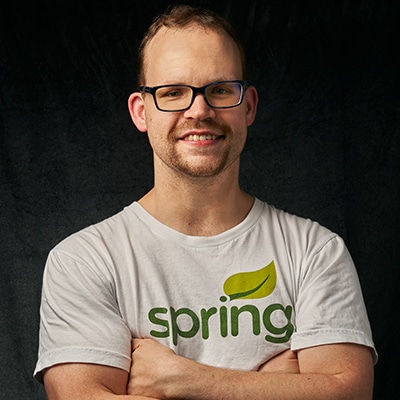
Josh Long
Spring
Josh Long
Josh (@starbuxman) has been the first Spring Developer Advocate since 2010. Josh is a Java Champion, author of 6 books (including O’Reilly’s “Cloud Native Java: Designing Resilient Systems with Spring Boot, Spring Cloud, and Cloud Foundry” and “Reactive Spring”) and numerous best-selling video training (including “Building Microservices with Spring Boot Livelessons” with Spring Boot co-founder Phil Webb), and an open-source contributor (Spring Boot, Spring Integration, Spring Cloud, Activiti and Vaadin, etc), a podcaster (“A Bootiful Podcast”) and a YouTuber.
Reactive Spring
Microservices and big-data increasingly confront us with the limitations of traditional input/output. In traditional IO, work that is IO-bound dominates threads. This wouldn’t be such a big deal if we could add more threads cheaply, but threads are expensive on the JVM, and most other platforms. Even if threads were cheap and infinitely scalable, we’d still be confronted with the faulty nature of networks. Things break, and they often do so in subtle, but non-exceptional ways. Traditional approaches to integration bury the faulty nature of networks behind overly simplifying abstractions. We need something better.
Spring Framework 5 is here! It introduces the Spring developer to a growing world of support for reactive programming across the Spring portfolio, starting with a new Netty-based web runtime, component model and module called Spring WebFlux, and then continuing to Spring Data Kay, Spring Security 5.0, Spring Boot 2.0 and Spring Cloud Finchley. Sure, it sounds like a lot, but don’t worry! Join me, your guide, Spring developer advocate Josh Long, and we’ll explore the wacky, wonderful world of Reactive Spring together.

Jack Shirazi
Hotels.com
Jack Shirazi
Jack Shirazi works in the Performance and Reliability team at Hotels.com, part of Expedia Group. He is the founder of JavaPerformanceTuning.com and author of Java Performance Tuning (O’Reilly), and has been an official Java
Champion since 2005.
Jack has worked at all levels and all stages of IT projects in several industries including with real-time, low latency and highly scaled applications. As well as authoring his popular book and contributing to several other books, Jack has published over 60 articles on Java performance for various sites and magazines; and has published over 200 newsletters for JavaPerformanceTuning.com over 15 years, and with these newsletters published around 10,000 Java performance and memory related tips.
What we Learned Moving Hundreds of Services into the Cloud: A Java/Kubernetes/Cassandra/DynamoDB Best Practices Story

Ivar Grimstad
Eclipse Foundation
Ivar Grimstad
Ivar Grimstad is the Jakarta EE Developer Advocate at Eclipse Foundation. He is a Java Champion and JUG Leader based in Sweden.
Ivar is the PMC Lead for Eclipse Enterprise for Java (EE4J) and involved in the Jakarta EE Working Group. He is also one of the community representatives in the JCP Executive Committee as well as specification lead for JSR 371 (MVC 1.0).
Ivar is also involved in Eclipse MicroProfile, Apache NetBeans and a frequent speaker at International developer conferences.
OpenDDR and Jakarta MVC

Otavio Goncalves de Santana
SouJava/Platform.sh
Otavio Goncalves de Santana
Otávio is a passionate software engineer focused on Java technology. He has experience mainly in persistence polyglot and high-performance applications in finances, social media, and e-commerce.
Otavio is a member of both Expert Groups and Expert Leader in several JSRs and JCP executive committee. He is working on several Apache and Eclipse Foundation projects such as Apache Tamaya, Eclipse JNoSQL, Eclipse MicroProfile, JakartaEE. A JUG leader and global speaker at JavaOne and Devoxx conferences. Otavio has received recognition for his OSS contributions such as the JCP Outstanding Award, Member of the year and innovative JSR, Duke’s Choice Award, and Java Champion Award, to name a few.
NoSQL Endgame
The amount of data collected by applications nowadays is growing at a scary pace. Many of them need to handle billions of users generating and consuming data at an incredible speed. Maybe you are wondering how to create an application like this? What is required? What works best for your project?
Architecting Cloud Computing Solutions with Java
Cloud-Native has become a big buzzword around the world, a term that is practically used by everyone at all times. But what does it mean? What are the advantages it brings to your application and your day as a software developer or architect? What’s new in the Java world, and what are the steps to follow for a native cloud application? This presentation is a step-by-step guide that will practically guide you through implementing Cloud computing services effectively and efficiently.
Topics:
- Cloud Native Concepts
- Anatomy of Cloud Native Systems
- Cloud Native Patterns
- The Twelve-Factor App
- Java specifications
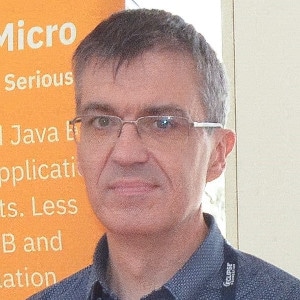
Rudy De Busscher
Payara Services
Rudy De Busscher
Rudy loves to create (web) applications with the Java EE platform and MicroProfile implementations and is currently working for Payara Services Limited in the Service Team. He helps customers, writes technical content, is part of some MicroProfile implementations and advocates the Payara Products in various ways.
He is active in the IT industry for more than 20 years and created many applications for customers. He is also a big fan of OpenSource and helped in various OpenSource projects like DeltaSpike, PrimeFaces, and Apache Myfaces. He is also passionate about Web Application Security using OAuth2, OpenID Connect, and JWT. He maintains the Octopus OpenSource project and is a member of the Jakarta EE Security API team.
How Class Data Sharing Can Speed up Your Jakarta EE Application Startup
Java Byte code is OS independent, which means that your application’s startup takes more time than a native image. Using the Class Data Sharing functionality introduced in more recent versions of the JVM, you can prepare your application so that it will load very fast.
In this presentation, I’ll go into more detail what Class Data Sharing is and the differences between the OpenJDK and OpenJ9 versions. With some Jakarta EE demo applications, you will see gains that you can achieve and reduce memory footprint a lot in Docker containers by sharing memory.

Chiamaka Okenwa

Chiamaka Okenwa
Chiamaka Okenwa is a software engineer with a demonstrated history of working in the fintech industry with a focus on product design and development. She is passionate about the developer communities in Africa and has served as a developer advocate for unStack Africa.
What is OAuth? Introduction on how the open authorization framework works
Discussion :: Women in Software Development Industry – Challenges, Career, Leadership

Alvaro Muñoz
GitHub Security Lab
Alvaro Muñoz
Alvaro Muñoz (@pwntester) works as Staff Security Researcher with GitHub Security Lab. His research focuses on different programming languages and web application frameworks searching for vulnerabilities or unsafe uses of APIs. Before joining the research field, he worked as an Application Security Consultant helping enterprises to deploy their application security programs. Muñoz has presented at many security conferences including DEF CON, RSA, AppSecEU, Protect, DISCCON, etc and holds several InfoSec certifications, including OSCP, GWAPT and CISSP, and is a proud member of int3pids CTF team. He blogs at http://www.pwntester.com.
How Variant Analysis helped secure the fight against COVID-19
In security, ‘variant analysis’ is the process of searching for variants of known vulnerabilities. This used to be done with grep and painstaking manual code audits, but it can be automated with a powerful semantic query language like CodeQL. I will show how we performed a variant analysis using CodeQL which started analyzing a vulnerability in Nexus Repository Manager and ended up finding many other critical vulnerabilities including a Remote Code Execution (RCE) in Germany’s Corona-Warn-App (German’s Contact tracing app). Finally, I’ll explain the factors that must come together to drive the adoption, scalability, and success of such technology.

Sun Tan
Red Hat
Sun Tan
Sun is a Senior Software Engineer and a Java developer with 15 years experience, currently working at Red Hat. Sun is involved in the Eclipse Che project from the very beginning as a core contributor. Sun has the community in his heart and is devoted to open source. He has been contributing to open source softwares while working for companies like Nuxeo, Serli and now Red Hat. Today, his adventure continues in sharing his source code, promoting great talks and speakers at his local Paris Java User Group, volunteering at Devoxx France, coding with Eclipse Che and enjoying his new hobby: brewing beer in his kitchen. Last but not least, Sun is behind the #CheJoy tweets: short videos showing great Eclipse Che features.
Eclipse Che – Live Demo

Andres Cespedes Morales
Mulesoft
Andres Cespedes Morales
Andres Cespedes Morales is a Java professional, working within the community since 2005. Speaker at several conferences in different languages, open-source contributor, and active blogger. Currently, working as Software Trainer at MuleSoft (a Salesforce company).
Software Security: A Modern Overview
Do you think that security is a responsibility only from security specialist? In this session, you will find why security is involved across different roles – especially developers – and how you can start developing more secure applications regardless of the programming language.

Rafał Leszko
Hazelcast
Rafał Leszko
Cloud software engineer at Hazelcast, author of the book “Continuous Delivery with Docker and Jenkins”, trainer, and conference speaker. He specializes in Java development, Cloud environments, and Continuous Delivery. Former employee in a number of companies and scientific organizations: Google, CERN, AGH University, and more.
Mutation Testing with PIT
How well tested is your system? How do you measure it? Code coverage can give you the answer, however can we trust our unit tests? Trust me or not, but I used to work for the investment banking industry in a big project where a lot of unit tests had no assertions (!). And yes… the coverage was very high.
Mutation testing is a method to check the quality of your unit tests and show more reasonable code coverage reports. In this session I will describe the idea of mutation testing and show a live example with the use of PIT Mutation Testing framework.

Nicolas Fränkel
Hazelcast
Nicolas Fränkel
Developer Advocate with 15+ years experience consulting for many different customers, in a wide range of contexts (such as telecoms, banking, insurances, large retail and public sector). Usually working on Java/Java EE and Spring technologies, but with focused interests like Rich Internet Applications, Testing, CI/CD and DevOps. Currently working for Hazelcast. Also double as a teacher in universities and higher education schools, a trainer and triples as a book author.
3 easy improvements in your microservices architecture
While a microservices architecture is more scalable than a monolith, it has a direct hit on performance.
To cope with that, one performance improvement is to set up a cache. It can be configured for database access, for REST calls or just to store session state across a cluster of server nodes. In this demo-based talk, I’ll show how Hazelcast In-Memory Data Grid can help you in each one of those areas and how to configure it. Hint: it’s much easier than one would expect.

Dmitry Alexandrov
Oracle
Dmitry Alexandrov
Dmitry is a Senior Principal developer at Oracle, Java Champion, Oracle Groundbreaker. He has more than a decade experience mainly in Java Enterprise in banking/telecom, but interested in dynamic languages on JVM and features like massive computations on GPUs. A true believer in open source and community driven initiatives. He is a co-lead of the Bulgarian Java User Group and co-organizer of jPrime Conf.
Dmitry is a blogger and also a frequent speaker at local events as well as conferences like JavaOne/CodeOne, Devoxx/Voxxed and Joker/JPoint.
Fly like a rocket with Helidon
Good news, everyone! Helidon got a jet engine! Now Helidon is packed with modern, high-tech, James Bond-level features and it flies like a rocket! Also, thanks to a nicely crafted fitness plan, the weight has been reduced and concentration increased – resulting in less RAM consumption and faster waking. Come to my live coding session to learn about all of the new features added in Helidon 2.2.0 such as GraalVM native image support in Helidon MP, MicroProfile Reactive Streams and Reactive Stream Operators, Helidon DB Client and HTTP Client in Helidon SE. I will also be demonstrating the new command line tool and live-reloading feature which will nitro-boost your development process. And there will be some new announcements!

Werner Keil
Creative Arts & Technologies
Werner Keil
Werner Keil has worked for more than 25 years as project manager, software architect, analyst and consultant on leading-edge technologies for Banking, Insurance, Telco/Mobile, Media and Public sector.
Among his earlier clients are Sony where Werner designed and implemented micro-format based tags for Sony Music.
He develops enterprise systems using Java, Java EE, Oracle or IBM, does Web design and development using Adobe, Ajax/JavaScript or dynamic languages like Ruby, PHP, etc.
Besides work for major companies he runs his own creative, talent and consulting agency Creative Arts & Technologies. In his spare time, he runs and supports open-source projects, writes song lyrics, novels, screenplays and technical articles. He is committing member of Eclipse Foundation, Apache Foundation and the Java Community Process, including his role as JSR-363 Spec Lead and Executive Committee Member.
OpenDDR and Jakarta MVC
NoSQL Endgame
The amount of data collected by applications nowadays is growing at a scary pace. Many of them need to handle billions of users generating and consuming data at an incredible speed. Maybe you are wondering how to create an application like this? What is required? What works best for your project?

Martin Toshev

Martin Toshev
Martin is a solution architect and IT consultant conducting professional trainings for novice and experienced developers. He is a Java enthusiast and one of the leads of the Bulgarian Java User group (BG JUG). Martin is also a regular speaker at Java conferences and helps with the organization of the jPrime conference in Bulgaria (http://jprime.io/).
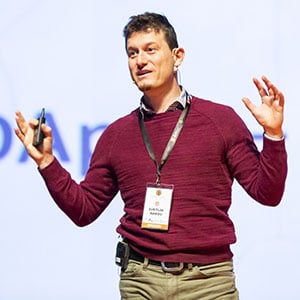
Svetlin Nakov
SoftUni
Svetlin Nakov
Svetlin Nakov (http://nakov.com) Svetlin Nakov has 20+ years of technical background as software engineer, project manager, consultant, trainer, and digital entrepreneur with rich technical experience (blockchain, Web development, information systems, databases, cryptography, C#, Java, JS, PHP, Python). Svetlin Nakov is a regular speaker at hundreds of conferences, seminars, courses and other trainings and holds a PhD degree in computer science. He is author of 15 books about computer programming and software technologies, lives in Sofia, Bulgaria and works as an passionate trainer and inspirer at SoftUni.
Programming Languages in 2021 – Trends and Opportunities
- Which are the most future proof languages for 2021?
- Review of most popular languages in 2020:
- Most used languages: Python, JavaScript, Java, C#
- Less often used languages: C++, PHP, TypeScript, Swift, Kotlin, Scala, Ruby, Visual Basic
- Specialized languages: Rust, Go, R, C, Objective-C, Dart, Perl
- Outside the standings (because they’re not programming languages): SQL, HTML, CSS, XML, JSON
- Language popularity indexes:
- Most sought after languages according to LinkedIn Jobs Worldwide?
- Languages with the most code written in GitHub?
- PYPL: language popularity based on Google Trends
- TIOBE: language popularity according to global search enginges
- Most discussed languages in StackOverflow?
- Why all these popularity indexes are unreal and skewed?
- For beginners: which language should I start with?
- Why the actual language doesn’t matter much?
- Which languages are most sough after in Bulgaria (according to LinkedIn Jobs Bulgaria)?
- Summary: which languages to learn during 2021 and why?

Naresha K

Naresha K
Naresha works as Technical Excellence Coach and Cloud Transformation Catalyst. He works with the developers to improve their professional practices to get better at developing maintainable applications that deliver business value. He also helps teams to architect solutions for the cloud and migrate applications to cloud platforms. He has been developing enterprise software for more than 12 years.
Naresha is the founder organizer of Bangalore Groovy User Group. He has been a speaker at several conferences including GR8 Conf EU, Functional Conf, GR8 Conf India, Grails Conf, GIDS, Eclipse Summit and Selenium Conf.
Evolving with Java – How to Remain Effective
Take Control of your Integration Testing with TestContainers
How easy is it to write and maintain integration tests when your system under test interacts with databases, message stores, and other external systems? It can be quite challenging, can’t it? For example, the lack of control over the setup of databases can increase the cost of integration testing. Sometimes we take the route of using an in-memory database instead of the one we employ in the production environment, making the tests less effective. With Docker containers, you can simplify this to some extent by running the setup before invoking your tests. Imagine if you get to control the database environment right from within the test code. TestContainers bring in this convenience.
TestContainers is a tool that you can invoke from your test code. It provides lightweight, throwaway instances of common databases, web browsers(Selenium tests), or anything else that can run in a Docker container. In this presentation, I walk you through how TestContainers is the most effective way to take advantage of Docker containers for integration testing. I present through several use-cases and demonstrate how TestContainers simplifies integration testing.

Dr. Pavlin Dobrev
Bosch.IO
Dr. Pavlin Dobrev
Dr. Pavlin Dobrev is a Director at Bosch.IO. The company owned by Bosch is focused on developing AI-powered Internet of Things (IoT) solutions focused on connected IoT ecosystem and tear down silos to create a truly connected world. He is charge for the Quality Management of the Bosch IoT Suite, the entire support of ISO 9001, ISO 20000 and ISO 27001 at Bosch.IO, as well as various research and customer projects.
Dr. Dobrev has more than two decades of experience with IoT, AI, Cloud and Java technologies, as well as in OSGi and embedded systems. He is an active participant in the OSGi Alliance, Java Community Process and other technical standards groups. He is a member of the Eclipse Foundation and participates in the development of the Eclipse IDE as a committer in the Equinox project.
Pavlin Dobrev has a PhD in Computer Systems in the area of Knowledge Management from the Institute for Parallel Processing, Bulgarian Academy of Sciences and holds an MsC in Computer Science from the Faculty of Mathematics and Informatics of Sofia University. He has written many scientific and technical publications and participated as speaker in prestigious international conferences.
Opening

Chavdar Baykov
Paysafe Group
Chavdar Baykov
Chavdar is a Solutions Architect in the Digital Wallets division of Paysafe Group, with over 20 years of experience in software development as a Software Engineer and Architect. His interests besides solving the business problems with technology include clean code, agile architecture, and software development best practices.
Practical Application of API-First approach in microservice development
Building complex applications using microservices-based architecture naturally involves a great amount of remote communication based on RESTful APIs. The REST APIs represent the contract of the microservice, with both external and internal stakeholders. Microservices, with poorly designed and unstable APIs, might pose a challenge for the whole application stack, for both adoption and maintenance. In this session, we will dig into the benefits of the API-First development approach, for designing stable, clean, and robust microservice APIs. We will showcase a practical example of how API-First development can be streamlined for developing and consuming Spring-based Java microservices, leveraging mostly free and open source technologies.

Nikola Bogdanov
Endava
Nikola Bogdanov
Nikola is Senior Project Manager at Endava in Sofia and an Agile coach with over 10 years of experience in the IT field. He is one of the most recognizable people in Bulgaria when it comes to Agile and Lean. Working as a Scrum Master and Agile coach, Nikola helps teams and organizations improve their processes continuously.
10 Agile Steps for Technical Excellence and Built-in Quality
High Technical excellence is key for our Agile teams in order to succeed. It’s nothing new, but often we face projects with so many issues, poor quality and technical debt that to be agile becomes impossible.
As Leaders we coach, mentor, and teach Agility, but how can we incorporate the Agile mindset and principles in the main activity – the Software engineering itself?
In this session, we will explain and will tell stories from the practice about the relationship between our mindset and our code.
Practical Neuroscience in an Agile Environment
This webinar will focus on how the brain works and how we can take advantage of that in our day-to-day work life. We will cover different scientific aspects of Psychology and Neuroscience, which we can relate and use in regular activities like running a retrospective, for example.

Maria Hristova
Sofia Municipal Agency for Privatization and Investment
Maria Hristova
Maria Hristova, PhD has a Master’s degree in Business and Human Resources Development & Administration. She specialized in Paris X Nanterre, integrating people with physical and mental disabilities. She is developing a scientific paper on the topic of Development of the dual career model in Bulgaria.
Maria has held the position of Commercial Director in a digital marketing agency for almost 14 years. She has been a lecturer in statistics for more than 4 years, and currently holds the position of Chief Executive Officer of the Sofia Municipal Agency for Privatization and Investment, part of the general administration of Sofia Municipality.
Result-oriented specialist in the field of digital strategies, innovations in the educational system and the dialogue between business, education and administration.
Opening

Svetlin Zhekov
Endava
Svetlin Zhekov
Svetlin is a software engineer with over 15 years of professional experience in developing Java applications. He works as Development Consultant at Endava in Sofia for the past 3 years. His work experience includes positions such as Team Lead, Technical Consultant and Technical manager.

Iskren Chernev

Iskren Chernev
Iskren maintains backend infrastructure for millions of users for a messaging company, writing asynchronous code before it was cool. He’s also a maintainer of moment.js.
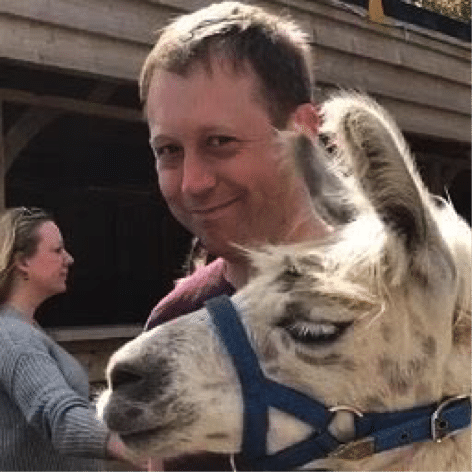
Tony Roberts

Tony Roberts
Tony has been in the finance industry for over 15 years. He worked as a developer for boutique hedge funds through to some of the largest financial firms before taking on the role of CTO at a successful fintech startup. In 2010 he launched PyXLL, an Excel Add-In with tens of thousands of users in a wide variety of industries, and more recently released the Java Excel Add-In “Jinx”. In a previous life he developed graphics engines for console games.
Working with Microsoft Excel in Java

Nikos Papageorgiou

Nikos Papageorgiou
Code as prose: Lessons from our colleagues

Irina Kamalova
Alveo Technology
Irina Kamalova
Irina Kamalova is a Senior Software Engineer at Alveo Technology. Working with Java and Scala, she developed and deployed a lot of projects to production.
Discussion :: Women in Software Development Industry – Challenges, Career, Leadership
Triangle of Cassanda & Solr & Kafka

Sofia Lyateva
Devexperts
Sofia Lyateva
Aside from being the Corporate Communications & Employer Brand Expert for Devexperts in Europe, Sofia is also a Women Techmakers Lead for Bulgaria & Google Developers Group Sofia organizer. She has been developing IT communities and helping IT brands thrive for 4 years now. Her previous experience includes PR expertise and leading socially responsible local & international NGOs.
Sofia has also been recognized various times among the Bulgarian IT ecosystem and also received the 2018 Global Tech Summit Award for Dev Community Contributor organized by DevStyleR.
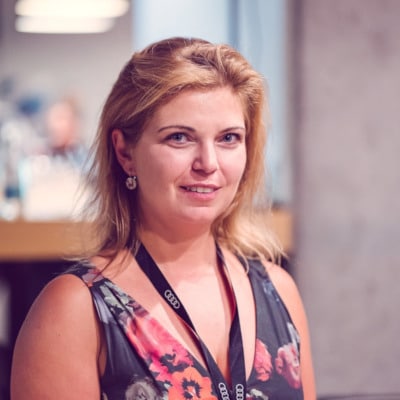
Rayna Stankova
Women Who Code Sofia
Rayna Stankova
Rayna Stankova, software engineer at VMware Bulgaria with more than 10 years of experience in the IT industry, has been managing Women Who Code Sofia since 2017. She started her career as a quality engineer thanks to critical thinking and passion for problem solving. The development of products with high quality and satisfying the requirements of the clients has become of high priority in her working day. For Rayna, it is important to share knowledge, so she actively participates in conferences and events, giving lectures and workshops.
She strongly believes that women have a lot to give to the IT industry, so she launched Women Who Code Sofia. The organization started as a small community of enthusiasts, and now they are the largest and most famous women’s organization in Sofia.
Where Rayna spends her free time: Volunteering. Photography. Travel. Healthy food. Squash.
Discussion :: Women in Software Development Industry – Challenges, Career, Leadership

Martin Kulov
Association of Software Engineers
Martin Kulov
Martin Kulov has 20 years professional experience in the software industry. During the years he has held various positions in the professional software engineering field. Martin helps building high quality software systems and teams. He loves to make software work better and faster, and to solve critical problems in production environments.
He is long time speaker at events related to Microsoft technology in Bulgaria and abroad. He has been awarded as Microsoft Most Valuable Professional (MVP). Martin is a member of Microsoft Regional Directors Program.
Martin is president of Association of Software Engineers, non-profit organization that thrives to help software engineers in their lifelong learning activities and professional development.
Create a blazing fast website using Azure Static Web Apps and Azure Functions

Nikolay Milovanov
ThingsLog
Nikolay Milovanov
Nikolay is a network freak and lazy software nerd ☺ He has a PhD from NBU in “IPv4 to IPv6 network transformation” and a specialization in Architectures for Software systems from Carnegie Mellon University. Through the years Nikolay has worked for many companies like Globul, D-Telecom, SevOne, Comptel, Nokia, Deloitte, BMW. In ThingsLog Nikolay is acting as a product owner and CEO.
LoRa network distributed network logging and monitoring
LoRa is an LPWAN radio technology that works in ISM radio spectrum. The spectrum is free for use but still regulated and each user has to follow certain rules.
In this talk Nikolay will present an independent solution for distributed IoT LoRa network monitoring and logging. The solution reveals the top talkers in certain area and provides a good idea of the state of the LoRa radio spectrum. Finally a live demo will be done based on real data feeds from Sofia, Bulgaria.
Introduction to LoRa and LPWAN
LoRa is a radio technology for sending short data messages over long distances with minimal energy consumption. In this talk Nikolay will do a short introduction to LoRa chirp modulation, LPWAN and LoRaWAN protocol, deployment options, network operator types and best practices.

Marchela Mincheva

Marchela Mincheva

Jacek Bosiacki
DataArt
Jacek Bosiacki
Jacek has been working in the IT industry for 6 years. Starting from testing, he went through business analysis and until today, he develops his skills programming in Java. Along the way, he had short episodes in User Experience, and once trained people in databases and application execution processes in Java. After hours, he loves playing basketball, snowboarding and playing bridge. His real passion is West Coast Swing – an unusual, elegant dance.
How to write code efficiently?
Every time you switch from keyboard to mouse and back it takes several seconds. Nowadays IDEs provide possibility to avoid using mouse in almost every main function. I’d like to show you how to write code in IntelliJ with limiting mouse usage to minimum. Also, you will see how easily you can use IntelliJ to learn most of shortcuts just by coding.

Martin Kuvandzhiev
GoStartups
Martin Kuvandzhiev
Martin Kuvandzhiev is an Engineer, Innovator and Entrepreneur. He starts working as Software developer at age of 18 right after finishing high school. Martin is the Founder of GoStartups, CEO of Assetify and board member of Bitcoin Gold. His companies are oriented in fintech, healthcare and blockchain. Despite the fact that Martin runs 2 companies he still does development and is specialized in iOS development. Martin has plenty of experience in creating products from scratch and that is the reason why his topic of development is specifically for that – creating a great app architecture from the beginning.
Creating the right iOS application structure for future-proof development

Preslav Mihaylov
Uber
Preslav Mihaylov
Preslav is a software engineer at Uber, working with microservices written in Go & Java.
Also teaching programming since 2015, leading lectures & seminars on various topics from the programming world to both aspiring programmers & experienced developers from Bulgaria, Serbia, Australia, Singapore, The Philippines & more.
In my free time, I’m maintaining todocheck – a tiny linter, written in Go which connects your TODOs to your tasks in your issue tracker.
Threading safely in Java

Boris Nikolov
GoStartups
Boris Nikolov
Boris is a software-development enthusiast and a strong state-of-the-art technologies advocate. Starting to show interest in software development in the early high-school years, Boris has spent a lot of his time exploring the different types of software in order to master all their strengths and weaknesses and be able to make the crucially important decisions inevitable during every product development life cycle. This way he is able to ensure the future-proof architecture and scalability of all developed products under his leadership. Boris is currently the leading technologist in GoStartups and specializes in Android and Back-end development.
Creating the right Android application structure for future-proof development

Trayan Iliev
IPT
Trayan Iliev
Trayan Iliev (https://www.linkedin.com/in/trayaniliev/) is developer of end-to-end reactive full-stack applications and services using ES, TypeScript, Angular, React and Vue.js clients, and Spring, Java EE, Reactor, Kafka, Golang, Flask, and Express back-ends. He has 15+ years of software development experience and 12+ years experience as enterprise IT trainer. Trayan is CTO of IPT – Intellectual Products & Technologies – training and consultancy company, focused on novelties in front-end and REST/gRPC/GraphQL backend development – reactive UI, end-to-end reactive programming, distributed event stream processing, distributed machine learning, and real-time micro-service architectures. Trayan has presentations on local developer conferences such as Java2Days, Voxxed Days, jPrime, jProfessionals, BGOUG, on topics like Spring 5, Reactor, SOA & REST, Kafka, Pulsar, Java EE, React, Angular, Ionic, Express.js, RxJS, reactive robotics and IoT. He is robotics/smart-things/ IoT enthusiast and organizes RoboLearn hackathons in Sofia.
Making Machine Learning Easy with H2O and Spring
Machine learning is becoming a must for many business domains and applications. H2O is a best-of-breed, open source, distributed machine learning library written in Java. The presentation shows how to create and train different type of supervised and unsupervised machine learning models easily using H2O Flow web interface – including Deep Learning Neural Networks, Automatic Machine Learning AutoML), Distributed Random Forest (DRF), Generalized Linear Model (GLM), Gradient Boosting Machine (GBM), XGBoost, Principal Component Analysis (PCA), Generalized Low Rank Models (GLRM), Word2Vec among the many. The session finishes with a demo showing how to incorporate some of the trained models in a real-time streaming web service implemented using Spring 5 Web Flux and Spring Boot.

